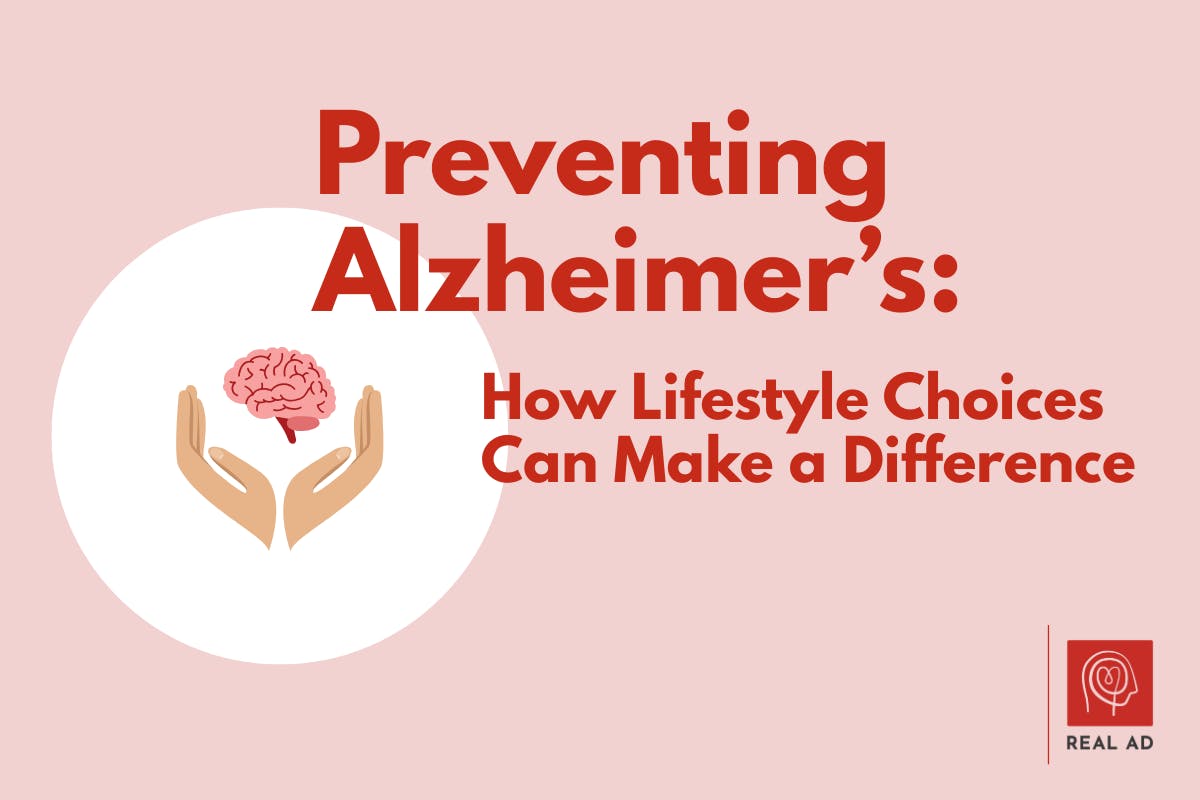Preventing Alzheimer’s Disease? How Lifestyle Choices Can Make a Difference
June 4, 2025
Alzheimer’s disease is a complex puzzle composed of various factors. This puzzle includes unmodifiable elements such as age, sex, and genetics, however, there is good news: there are also modifiable risk factors such as habits and lifestyle choices we can influence to help reduce our risk of developing this condition. Recent research, particularly the 2024 update from the Lancet Commission on Dementia1,2, highlights the importance of understanding these risk factors for the prevention and management of Alzheimer’s disease (AD).
Given the importance of lifestyle factors, the REAL AD study has included optional, add-on questionnaires focused on participants’ lifestyle habits. These questionnaires allow us to further explore how diet, physical activity, social engagement, and other modifiable behaviors relate to cognitive health and Alzheimer’s risk.
Understanding these risk factors can help guide strategies to reduce Alzheimer’s risk, and we would now like to turn to the key modifiable risk factors that research has identified as particularly important.
Modifiable Risk FactorsModifiable risk factors present opportunities for individuals to take control of their health and potentially reduce their risk of developing AD. In fact, the Lancet Commission suggests that approximately 45% of dementia cases worldwide could be prevented or at least delayed by addressing these modifiable risk factors, Key modifiable risk factors including:
- Physical activity: Engaging in regular exercise is one of the most effective ways to support brain health. Both aerobic activities, such as walking or swimming, and strength training are beneficial. Strength training is particularly important for women, as it helps maintain muscle mass, improve balance, and reduce the risk of falls, which are crucial for maintaining independence as we age. Unfortunately, strength training is often overlooked for women, despite its significant benefits for both physical and cognitive health.³
- Diet: A balanced diet rich in fruits, vegetables, whole grains, and healthy fats, like the Mediterranean diet, can positively impact cognitive health.
- Cognitive engagement: Keeping the brain active through lifelong learning, reading, and engaging in mentally stimulating activities can help build cognitive reserve. This reserve may delay the onset of dementia symptoms.
- Social connections: Maintaining strong social ties is vital for mental well-being. Engaging with friends and family can provide emotional support and reduce feelings of isolation, which is a significant risk factor for cognitive decline.
- Cardiovascular health: Managing conditions such as high blood pressure, diabetes, and high cholesterol is crucial for brain health. These conditions can increase the risk of vascular damage, which is linked to Alzheimer’s disease.
- Hearing and vision health: Addressing hearing and vision impairments can significantly reduce the risk of cognitive decline. Untreated hearing loss can lead to social isolation and reduced cognitive engagement, both of which are risk factors for dementia. Additionally, the 2024 Lancet Commission report highlights that vision loss is now recognised as a new risk factor for Alzheimer’s disease. Impaired vision can limit an individual's ability to engage in activities that promote cognitive health, such as reading or participating in social interactions.
- Stop smoking: Quitting smoking can significantly reduce the risk of cognitive decline. The harmful effects of tobacco on vascular health can contribute to the development of Alzheimer’s disease.
- Reducing alcohol intake: It is important to reduce alcohol consumption due to its harmful effects on the brain. Excessive alcohol intake is associated with an increased risk of dementia, emphasising the necessity of moderation to protect cognitive health.

While sleep is not explicitly listed among the modifiable risk factors in the Lancet Commission reports, it plays a crucial role in brain health. Quality sleep is essential for memory consolidation and the removal of neurotoxic waste products from the brain. Poor sleep quality and sleep disorders (such as obstructive sleep apnoea) can contribute to cognitive decline, making it vital to screen for sleep disturbances as well as focus on prioritising good sleep hygiene.
Good sleep hygiene involves practices that promote consistent, restful sleep, such as maintaining a regular sleep schedule, creating a comfortable sleep environment, limiting exposure to screens before bedtime, and avoiding caffeine and heavy meals in the evening.⁴ Interested in learning more about sleep? Read our dedicated article here.
Understanding the non-modifiable and modifiable risk factors for Alzheimer’s disease empowers individuals to take proactive steps towards reducing their risk. By focusing on lifestyle choices such as engaging in regular physical and cognitive activity, maintaining a balanced diet, and fostering social connections, individuals can positively influence their cognitive health.
Alzheimer’s disease may be a complex puzzle, but by recognising the pieces we can influence, we can move towards a healthier future. Every small change can contribute to a significant impact on brain health, empowering us to take charge of our well-being and reduce the risk of Alzheimer’s disease.